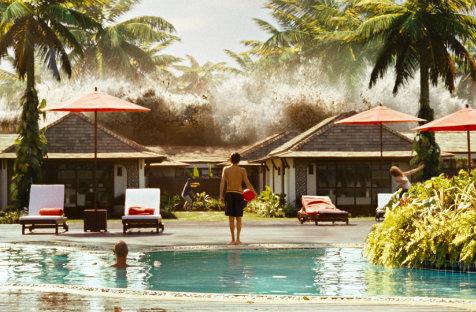Sunday 26 December 2004 ranks among the rare dates immortalised in public memory, with most aware of their whereabouts when tragedy struck. Glued to television screens, the world watched as an undersea earthquake off the coast of Indonesia caused a series of tsunamis, decimating Southeast Asia and claiming more than 220,000 lives.
Spanish filmmaker Juan Antonio Bayona explores the disaster in The Impossible (Lo imposible), his second feature. Unlike Clint Eastwood’s Hereafter, which relegated the catastrophe to a supporting role, Bayona’s film places the disaster front and centre, though his narrative is focused on the experiences of a holidaying family – detailing their gleeful arrival in Thailand for Christmas, the wall of water that transformed the idyllic setting into a sodden wasteland, and the struggle for survival that characterised their days afterwards.
Maria Bennett (Naomi Watts, You Will Meet a Tall Dark Stranger), her husband Henry (Ewan McGregor, Haywire) and their three sons Lucas (debutant Tom Holland), Thomas (fellow newcomer Samuel Joslin) and Simon (Oaklee Pendergast, TV’s Casualty) touch down in search of rest and relaxation, and at first, that’s what they find. Then an ordinary morning turns ugly as the tsunami hits; instead of lazing by the pool, the family is separated by the surging sea, fighting for their lives.
Bayona wastes little time in immersing the audience in the devastation, nor does he spare the terrifying details. His background in horror – as seen in 2007’s atmospheric thriller The Orphanage – comes to the fore as he chronicles Maria and Lucas’ search for safety, medical attention, and the rest of their family. Alternating between the hyper-real and surreal in his sensory assault, emotions and tensions are heightened, with some moments wallowing in melodrama. Thankfully, the unnerving intensity remains in every astounding special effects shot and intimate close-up, as does discomfort and heartbreak.
The technical wizardry of the director, his precise cinematographer Óscar Faura (Julia’s Eyes) and exacting editor Elena Ruiz (Eva) may prove the film’s highlight, however its trio of leads offer honest and compassionate performances, with none better than Oscar nominee Watts. And while their casting in a true story based on the plight of a Spanish family (with María Belón’s account of the events inspiring Sergio G. Sánchez’s screenplay) may be questionable, as is the decision to focus on tourists rather than locals, their exceptional portrayals cannot be dismissed.
Similarly, the underlying statement on the fragility of physical, material and emotional comfort resonates throughout every suspense-filled moment, perhaps amplified by the characters’ cultural context. The Impossible may offer a narrow, emotionally manipulative glimpse of the tragedy, but it does so with empathy; the end result is as touching as it is traumatic.
Rating: 4 stars out of 5
The Impossible
Director: Juan Antonio Bayona
Spain, 2012, 114 min
In cinemas January 24
Distributor: Hoyts
Rated M
Actors:
Director:
Format:
Country:
Release:





